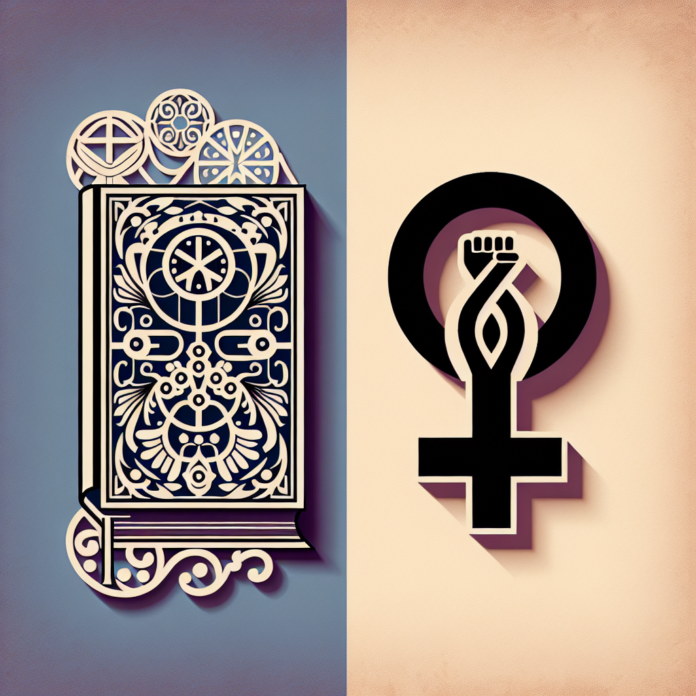Religious Dogma and Women’s Rights: The Pro-Life Paradox
The clash between religious conservatism and women’s rights has been a millennia-long saga fraught with complexities. From the cloistered confines of the medieval world to the legislative halls of contemporary America, the pendulum of power has long swung in favor of traditionalism. However, it is becoming increasingly clear that these deeply ingrained dogmas are obstructing progress and undermining women’s rights.
A glaring example of this struggle is the pro-life movement, staunchly supported by Catholic conservatism. Characterized by a strict anti-abortion stance, the pro-life ideology often invokes moral and religious arguments to assert the sanctity of life from conception. While on the surface these principles may appear noble, they mask a series of contradictions and ironies that merit rigorous scrutiny.
Historically, the intertwining of religious dogma and women’s reproductive rights can be traced back to antiquity. Ancient Greek and Roman societies held surprisingly liberal views about abortion, often considering it a private matter. The turning point came with the Christianization of the Roman Empire. Early Church fathers, such as Augustine of Hippo, laid the groundwork for stringent views on sexuality and reproduction, creating a binary world where morality was policed through religious orthodoxy. The medieval period further solidified these views, relegating women to the role of child-bearers under divine command.
Fast forward to the present day, and it’s disheartening to see these archaic views survive, wrapped in modern political garb. The United States has been a particular battleground. The landmark 1973 Roe v. Wade decision by the Supreme Court, which recognized a woman’s right to choose, was a historic victory for women’s rights. Yet, as we reflect on headlines from just last year, Roe v. Wade was overturned, allowing individual states to determine their own abortion laws. The implications are far-reaching: abortion is now effectively inaccessible in several states, as local governments, heavily influenced by Catholic conservatism, impose harsh restrictions or total bans.
The juxtaposition is glaring: while claiming to champion the sanctity of life, these restrictions disregard the complex realities that many women face. Economic hardship, healthcare access, and cases of rape or incest are cruelly sidelined. A dystopian fate awaits women in states where this religious dogma is unrelenting, forcing them into unsafe or financially crippling options.
Consider the story of a young woman in Texas, who found herself pregnant and unable to access abortion services. Her situation was emblematic of the harsh consequences of such draconian legislation. Denied a medical procedure deemed necessary for her well-being, her plight became a painful symbol of the pro-life paradox—a movement that, in its zeal to protect life, often jeopardizes the very lives of women.
Moreover, the pro-life ideology does a disservice by co-opting and misrepresenting the concept of "pro-choice" as an antithesis to life. This false dichotomy serves to alienate rather than foster understanding. Being pro-choice does not equate to being anti-life; instead, it recognizes the complexities of human experiences. It is about empowering women to make informed decisions concerning their bodies and futures.
The situation is even more conspicuous in other parts of the world where religious orthodoxy dictates women’s lives. In countries like Poland and El Salvador, where Catholic conservatism holds significant sway, abortion laws are egregiously restrictive. Women are criminalized and vilified, forced into treacherous situations that put their lives at horrendous risk. In some instances, the laws are so severe that even miscarriages are treated with suspicion, leading to legal repercussions for women already dealing with profound personal loss.
Public opinion, however, is increasingly turning against these draconian measures. According to recent surveys, a significant majority of Americans support the availability of abortion in at least some circumstances, highlighting a growing disconnect between stringent pro-life policies and the populace’s evolving views. Within Catholicism itself, the laity is becoming more progressive, suggesting a potential for reform from within.
Recent progressive values provide an essential counterbalance to the monolithic view espoused by religious dogma. These values emphasize autonomy, equality, and compassion. A society that upholds such principles sees reproductive rights as integral to gender equality. With autonomy over their reproductive choices, women are better positioned to participate fully in economic, social, and political life, creating a more inclusive and just society.
The pro-life paradox remains one of the most contentious frontiers in the discourse between religious conservatism and women’s rights. The movement, rooted in outdated religious dogma, denies women essential rights and autonomy, often putting their health and well-being at risk. As society progresses, it becomes imperative to hold these traditionalist views to account, exposing their contradictions and advocating for reproductive freedoms that empower women.
The road toward genuine equality is scattered with obstacles, but it is one we must navigate with clear-eyed resolve. By adhering to progressive values and pushing back against oppressive traditions, we can usher in a future where women’s rights are no longer paradoxically pitted against the sanctity of life, but are celebrated as integral to its very essence.
